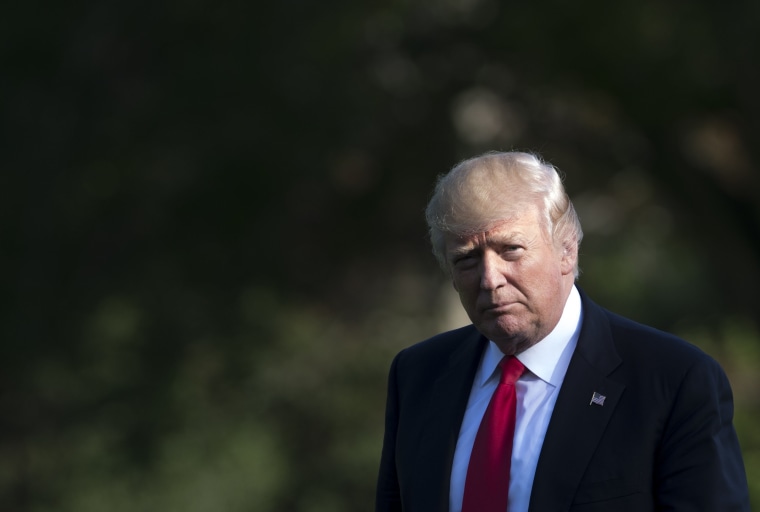"I think the president believes it is his role to improve race relations." That was the line Marc Short, the White House's legislative affairs director, shared on NBC's "Meet the Press" yesterday.
How's that working out?
The latest racial firestorm began on Friday night, when Donald Trump delivered a rambling speech in Alabama in which the president reflected on, of all things, sports. He noted, for example, that "they" are "ruining" the NFL by trying to reduce brain injuries. "You know, today, if you hit too hard, right, they hit too hard, 15 yards, throw him out of the game," Trump complained.
And if that were all he'd said, that would've merely been odd. But the president went much further:
"Wouldn't you love to see one of these NFL owners when somebody disrespects our flag to say, 'Get that son of a bitch off the field right now, out, he's fired, he's fired.' [...] Because that's a total disrespect of our heritage, that's a total disrespect of everything that we stand for, OK? Everything that we stand for."And I know we have freedoms and we have freedom of choice and many, many different freedoms. But you know what? It's still totally disrespectful. And, you know, when the NFL ratings are down massively, massively. Now, the number one reason happens to be that they like watching what's happening on, you know, with yours truly."
After suggesting that some Americans are so interested in him that they're watching less football, Trump added that fans should "leave the stadium" if they see players take a knee during the national anthem. "I guarantee things will stop, things will stop," he said. "Just pick up and leave, pick up and leave."
Apparently pleased with himself, the president announced via Twitter the next morning that the NBA's Golden State Warriors are no longer welcome at the White House, because Stephen Curry "hesitated" in response to an invitation.
And then he really got worked up. Trump complained that athletes should not be "allowed" to show "disrespect" towards the flag or the country, adding those who feel differently should be "fired." There were a series of related missives, culminating in the president calling football games "boring" and questioning the patriotism of the league.
The result, not surprisingly, was a sharp increase in the number of athletes protesting yesterday, and fierce criticism from players, owners, and league officials about Trump's latest attempts to divide Americans against one another.
The racial element of the president's offensive is hard to miss. Over the course of about a week, Trump has lashed out at ESPN's Jemele Hill, who is black, football players who take a knee, many of whom are black, and the NBA's Steph Curry, who is black. That the president apparently referred to Colin Kaepernick as a "son of a bitch" in front of a predominantly white audience in Alabama wasn't exactly subtle.
It also comes on the heels of Trump's defense of right-wing white protesters in Charlottesville, some of whom, the president insisted, were "very fine people." As recently as Aug. 15, he emphasized that they were "protesting very quietly," "innocently," and "legally." Trump added that the white protesters were justified in their demonstration because Confederate Gen. Robert E. Lee is "very, very important" to them.
However, when black athletes protest "very quietly," "innocently," and "legally" about an issue that's "very, very important" to them, the president seems to have a very different perspective. I'll look forward to the White House's explanation for why this is.
Indeed, it's one of several questions Trump World should have to answer. For example, why is it that when the president says something offensive, he celebrates his courageous stand against political correctness, but when athletes take a knee, Trump expects them to be fired? Why does this president believe he has the authority to push private employers to dismiss workers who participate in protests the White House disapproves of?
Why is it that Trump whined over and over and over again about Barack Obama showing an interest in sports, only to change direction after he took office?
Against a backdrop of a crisis in Puerto Rico, tensions with North Korea, and a key week on Capitol Hill for his own policy agenda, can the West Wing explain why the president is so focused on athletes' silent protests?
And what exactly is Trump's vision for how Americans are supposed to engage in political speech he disagrees with? Because over the weekend, the president went from complaining about a specific kind of dissent to questioning whether athletes should be "allowed" to dissent in ways Trump doesn't like.
For all of Trump's bluster on Friday night about "the values that made this country great," the president remains alarmingly hostile towards American principles such as accepting people of color engaging in peaceful, silent protests. He routinely uses words like "freedom" without bothering to invest time in understanding the depth of their meaning.
Trump believes it's "his role to improve race relations"? I believe he's failing spectacularly.
